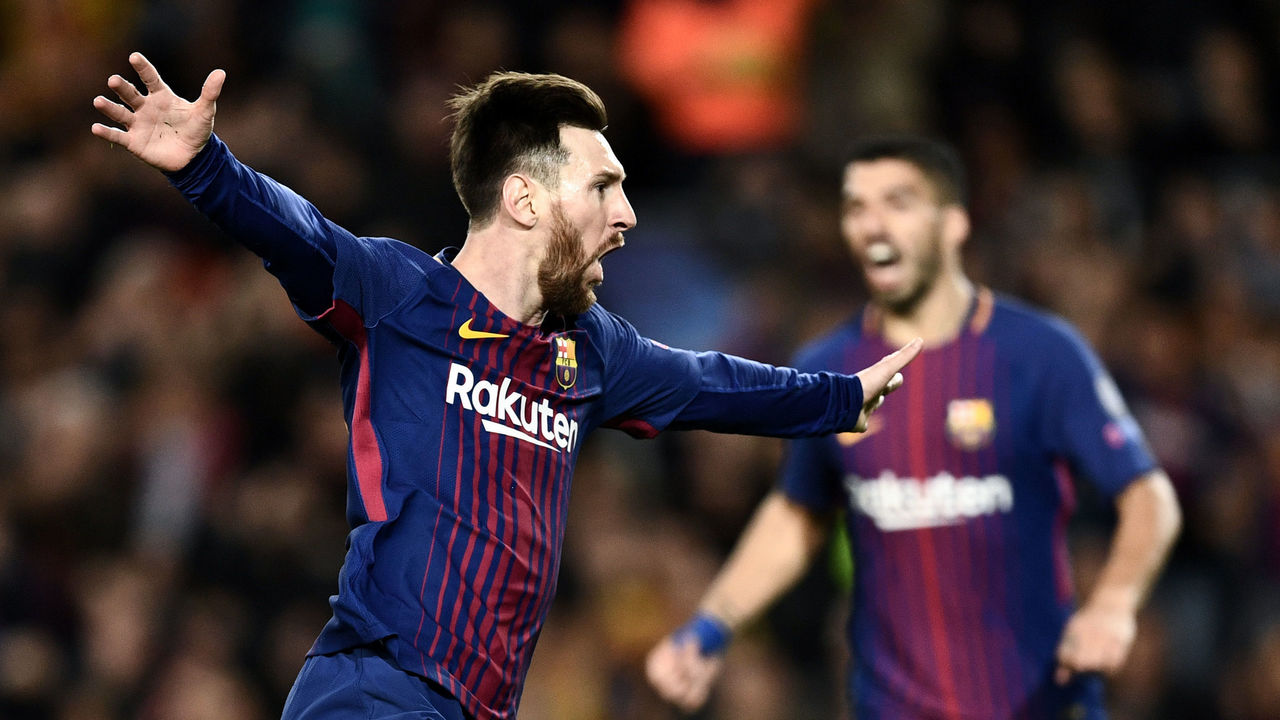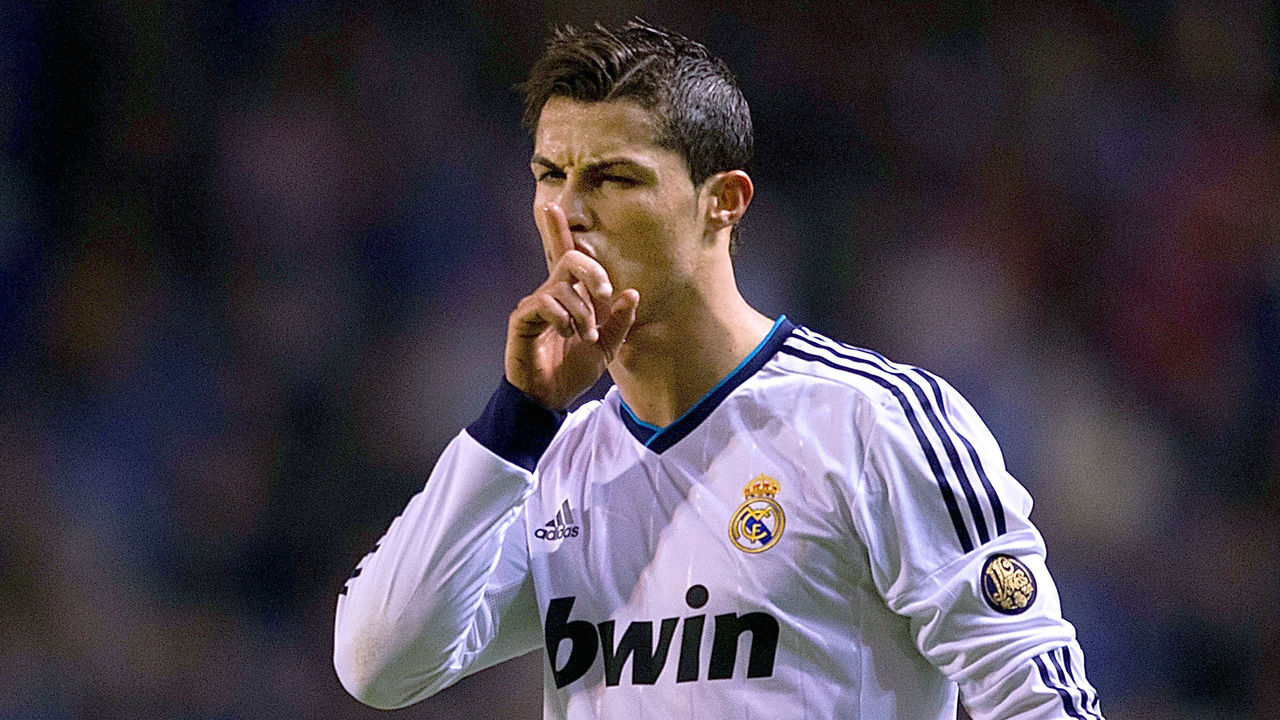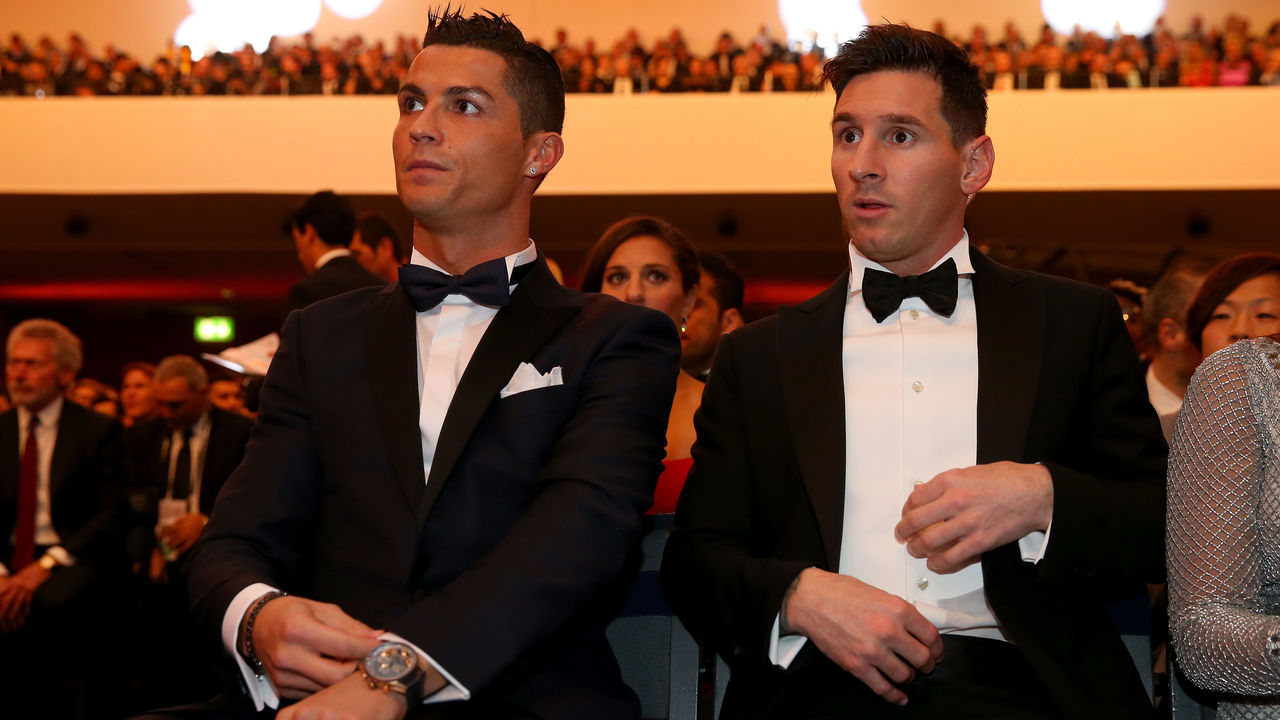Messi vs. Ronaldo: The defining rivalry of the decade
The rivalry as we know it took off in October 2012. Lionel Messi and Cristiano Ronaldo, the two greatest players of their generation, traded goals like punches in a heavyweight bout. There were 98,000 people in attendance at the Camp Nou. Most of them had come to show solidarity with the independence movement that was sweeping through Catalonia and to rail against a certain history of persecution. They were treated to a different kind of history instead.
Messi and Ronaldo had played against each other many times before, but not like this. Ronaldo struck in the 23rd minute, beating Victor Valdes at his near post with a ferocious strike. Eight minutes later, Messi responded with a ruthless volley from close range. Then Messi scored again. Then Ronaldo. El Clasico went as they went, ending 2-2. What was supposed to be a night of political grandstanding became a celebration of world-class talent. Messi and Ronaldo had separated themselves from the rest. "No one can keep up with them," the Guardian's Sid Lowe wrote at the time, "except each other."
The rivalry intensified over the next few years, not out of animosity or hatred, but out of pure competitive drive. Every match seemed to determine the fate of the Ballon d'Or. For a decade, no one won the award but them.
It was their contrasting styles that made them such great adversaries. Messi navigated tight spaces to reach his destination; Ronaldo barged right through. Which of the two you liked better said a lot about the kind of football you appreciated.
"The only thing they have in common is goals," former Spain coach Vicente del Bosque once said.

Their clubs mirrored their differences. Messi was made in Barcelona's image: short and intuitive, quick and exacting, a cerebral and cunning footballer who passed as well as he shot and saw things before they happened. Ronaldo's directness and barreling athleticism, on the other hand, made him a perfect match for Real Madrid, who built teams to win, not to entertain. Messi and Ronaldo weren't only rivals, they were complete opposites.
It's not the same now that Ronaldo is playing in Serie A with Juventus. The comparisons are less obvious. They spent a decade jockeying for position in La Liga, moving up and down the leaderboards, facing off regularly. Then suddenly, they lost their sparring partner.
"I miss Cristiano in Spain," Messi said. "It was lovely having him here, even though it annoyed me seeing him win so many titles. It would be great if he was still here."
Messi gave Ronaldo a challenge when no one else could, and vice versa. Ronaldo was older than Messi and thus took the early lead in the race to immortality. But Messi surpassed Ronaldo. He did things with the ball no one had seen since Diego Maradona. Barcelona were winning everything, including an unprecedented treble in 2009, and Messi was at the center of it all.
It may have seemed like Messi was merely a cog in a well-oiled machine. He's faced those accusations his entire career. It's true he found greater harmony with his teammates at Barcelona than he ever did with his countrymen, and it's probably why he's struggled so much in the international game with Argentina. Schooled to interpret the game as a series of sequences and to understand the geometry of the pitch, Barcelona players could understand the things he did. In reality, Messi transformed Barcelona, leading the club through its most successful period of all time.
Pep Guardiola did his part to help Messi become the tour de force he is today, teaching him how to exploit space and burst into channels with his trademark speed. It was Guardiola's aim to get Messi on the ball as much as possible. He considered it a crime whenever Messi loitered without much to do. Messi was too good to spend his career hoping for chances. Why wait when he could create them himself?
But not much was made of what actually made Messi so great. He just was. Guardiola merely guided him in the right direction.
Ronaldo's success was easier to measure. Stories were told of how many sit-ups he could do on a given day, about his strict diet, about the amount of sleep he'd get. Ronaldo was more human than Messi and showed more emotion because of it. He goaded the media into making the comparisons. He seemed to feel the rivalry more than Messi did.

Fans chanted "Messi" at him because they knew it would bother him. And it did. It bothered him when he was second-best, when all the hard work fell short. Ronaldo skipped award ceremonies when he found out he'd lost. He defended himself when things didn't go according to plan, and in doing so, he came off as arrogant, self-absorbed, hostile. He was only ever building himself up because people tried to tear him down.
"Do you know what (Messi) was doing this time last year?" Ronaldo snapped after fans of Denmark heckled him during a match at Euro 2012. "He was going out of the Copa America in the quarterfinals."
Messi had won four consecutive Ballons d'Or by the end of 2012, and when Fabio Cannavaro awarded it to him that December, Ronaldo sat there and pursed his lips. It hurt him. He'd scored 63 goals in that calendar year, a personal best and a ridiculous sum on its own. He just happened to do it the same year Messi hit 91.
It was Ronaldo who breathed life into the rivalry, giving it a sense of urgency that otherwise wouldn't have been there. He was the one who moved to Spain to challenge himself, to go up against the very best. If his transfer is no longer the most expensive, it remains one of the most important.
His relationship with Madrid was mutually beneficial. He needed Madrid to chase down Messi, and Madrid needed him to chase down Barcelona. And as Madrid became a greater threat to Barcelona, so too did Ronaldo to Messi. He was a selfish player at Manchester United, a winger who relied on stepovers and tricks to accomplish everything. But over nine years in the Spanish capital, Ronaldo evolved.
He used his speed to facilitate Madrid's unbelievable counterattack and learned that he too could drop deep and link up play. Some of his best moments were typical Ronaldo - he seemed to levitate when he lept for the ball and he punished goalkeepers with a barrage of shots - but there was more nuance to his game than there had been before. Later, he even accepted time on the bench so he could spring to life at the business end of each competition.
When Ronaldo tied Messi with a fifth Ballon d'Or in 2017, it was personal redemption. His life's work had built to that moment. He had won a trophy with his country - something Messi failed to do on multiple occasions - and led Madrid to the second of three consecutive Champions League titles. Entering the quarterfinals of the Champions League that season, Messi had 11 goals in the competition. Ronaldo only had two. But in a flash, Messi was out, and Ronaldo scored eight over the next two rounds against Atletico Madrid and Bayern Munich. He fired two more against Juventus in the final itself. Ronaldo had roared back.
"With Messi, the fight continues," he said after being presented the trophy. "In a good way."

Football had never had anything like this before. Pele and Maradona played in different eras and on different continents, making it harder to judge their achievements side by side. Messi and Ronaldo were entering their prime at the same time and gunning for the same titles.
Together, they elevated El Clasico, defining it just as they came to define their clubs, partly because they faced each other so damn much. In 2011, four of those Clasicos came over an 18-day span, in three separate competitions. Madrid beat Barcelona to win the Copa del Rey, but that was all they could muster. The Blaugrana held Los Blancos in La Liga, claiming a precious point en route to the title, and edged them 3-1 on aggregate in the Champions League semifinals. Messi and Ronaldo, of course, combined for five of the seven goals in those encounters.
El Clasico was big before they arrived, rich in symbolism, politics, and rivalry. But the more Messi and Ronaldo upped the ante, the more the contest became about them and less about the politics that had shaped it in the first place. Fans traveled from around the world to watch them go at it. The crowds became less local and more diverse. Hundreds of millions tuned in across almost 200 countries. Messi and Ronaldo globalized El Clasico and turned it into a referendum on who was better.
Every match, every season was an arms race. Messi scored 369 league goals in the 2010s and collected 23 trophies; Ronaldo hit 335 and added 19. Ronaldo has more Champions League goals and assists than anyone in history. Messi has the most league goals ever. He's two years younger, too. The statistics prove how close they were, but different stats tell different stories, liking choosing your own adventure.
They did this for the entire decade, going back and forth and topping their own records. Only they could outdo each other. If only they could do it for another 10 years.
HEADLINES
- Real Madrid's Endrick joins Lyon on loan until end of season
- 3rd-tier Avranches eliminate Ligue 1's Brest from Coupe de France
- PSG's Safonov ended Intercontinental Cup triumph with broken hand
- Palace slip into playoffs as Strasbourg finish top of Conference League
- Barcelona, Lyon, Chelsea reach Women's Champions League quarters